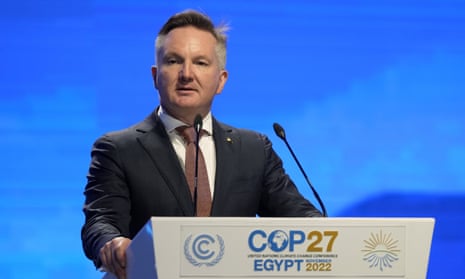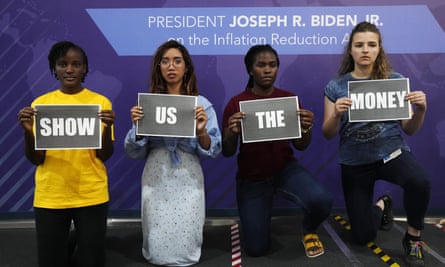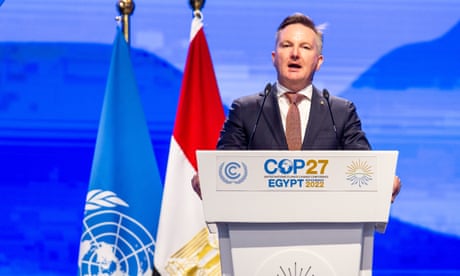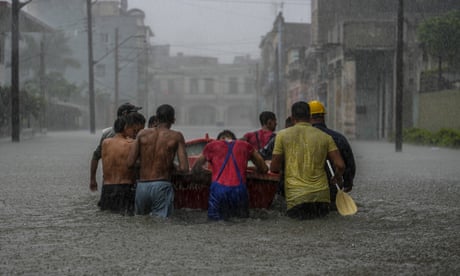Extract from The Guardian

The Cop27 climate summit ended in a desperate and confused flurry more than 40 hours late with a qualified victory clutched from the jaws of complete failure, but with the big issues unresolved.
If this sounds familiar, like so many climate summits before it, well … yes. There were genuine developments over the past week, some of which could reshape the global response to the crisis. But there was also intransigence and blocking where it mattered most. Some of that is getting worse.
Here are five takeaways from the conference, including Australia’s role.
The good news: a loss and damage response fund
For more than 30 years, developing countries have been demanding the wealthy take responsibility for rescue and reconstruction costs after climate disasters fuelled by skyrocketing emissions. For more than 30 years, the wealthy have resisted.
That changed in Sharm el-Sheikh, and it is a genuine and surprising step forward. It wasn’t confirmed that what is known as loss and damage would even be on the agenda until the eve of the conference. Two weeks on, there is agreement to establish a response fund to help vulnerable countries rebuild social and physical infrastructure after extreme weather events exacerbated by greenhouse gas emissions. The example cited time after time in Egypt was the devastating floods that wrecked Pakistan this year, affecting 33m people and causing an estimated US$30bn in damage. Pakistan’s climate minister, Sherry Rehman, was a quietly powerful advocate for change.
Negotiations over loss and damage were typically fraught, and the design of the fund is not yet locked in. Australia got involved as part of a group that pushed for a fund that would be paid for through a “mosaic” of channels, which means multilateral development banks and existing climate funds as well as rich countries.
Contentiously, it also brings in emerging economies such as China, Russia, Saudi Arabia and other Opec members that are now among the biggest historic and ongoing contributors to the problem. None of them think they should have to pay, and the final wording of the agreement leaves that point open to interpretation – for now.
While the details are to come, developing countries ended the conference in a rare moment of genuine celebration. If you believe in an equitable response to the climate crisis, this keeps that hope alive. But the hard decisions are still to come.

The bad news: a lack of ambition to cut emissions
Cop27 continued the fundamental failure of the UN process – a refusal to accept that fossil fuels are driving the climate crisis and must be curbed.
The final hours of the conference were a mess, as developed countries and small island states fought a rearguard action to keep the previously agreed goal that the world would attempt to limit global heating to 1.5C. As Australia’s Chris Bowen argued, removing it would have been a major backslide from last year’s Glasgow pact and a statement that countries were prepared to accept substantially worse climate breakdown.
In the end, 1.5C survived in the text, but the goal was only acknowledged, and there is no plan to get the world there. We’re already at 1.1C.
Dozens of countries argued for a long-overdue recognition that all fossil fuels, including oil and gas, must be phased down. They also wanted a statement that global emissions would peak by 2025. Both were blocked.
Instead, the conference just repeated a previously agreed and weakly worded statement that “unabated coal power” should be phased down (but not necessarily out). The need to accelerate renewable energy got a few mentions, but inserted alongside it was a new reference to “low emissions” energy. It was widely interpreted as meaning gas, which does not actually have low emissions.

But the delegation clearly benefited from following an administration that was considered a laggard. Labor’s new targets and policies are a significant improvement but do not yet match Bowen’s rhetoric about aiming for 1.5C. The government came to the conference without any new commitments on climate finance or money for loss and damage. Meanwhile, the country’s fossil fuel exports remain world-leading.
Privately, there is a view in the government that the investment shift to cleaner energy will mean most proposed fossil fuel developments won’t go ahead. Bowen says there will be no more subsidies. It will be noticed internationally, and particularly in the Pacific, if this isn’t the case.
There was a noteworthy speech by Australia’s chief negotiator, Sally Box, in the final plenary in Egypt when, addressing the conference on behalf of a developed country bloc known as the umbrella group, she said it was “deeply disappointed” and called for an “urgent escalation of our efforts” as countries “must go further in light of the stark findings of the latest science”.
It is the right rhetoric, and the standard that the Albanese government should be judged against along with everyone else.
The Pac Cop may be on its way
Australia appears well placed with its bid to co-host the 2026 climate conference – Cop31 – with Pacific countries. Switzerland, a potential rival, has pulled out and is backing Australia. Turkey is in the race, but Australia is considered more likely to win support from the “Western Europe and Others” group that will decide hosting rights that year.
While it is yet to puncture the public consciousness, hosting a UN climate summit with tens of thousands of delegates and observers could be a genuinely transformative moment in how Australia thinks about climate change. There would be increased focus on policies, targets, green energy potential and plans for fossil fuels. Pacific countries would want a say in how it was run. We should know if the Albanese government has been successful before the next election.


No comments:
Post a Comment